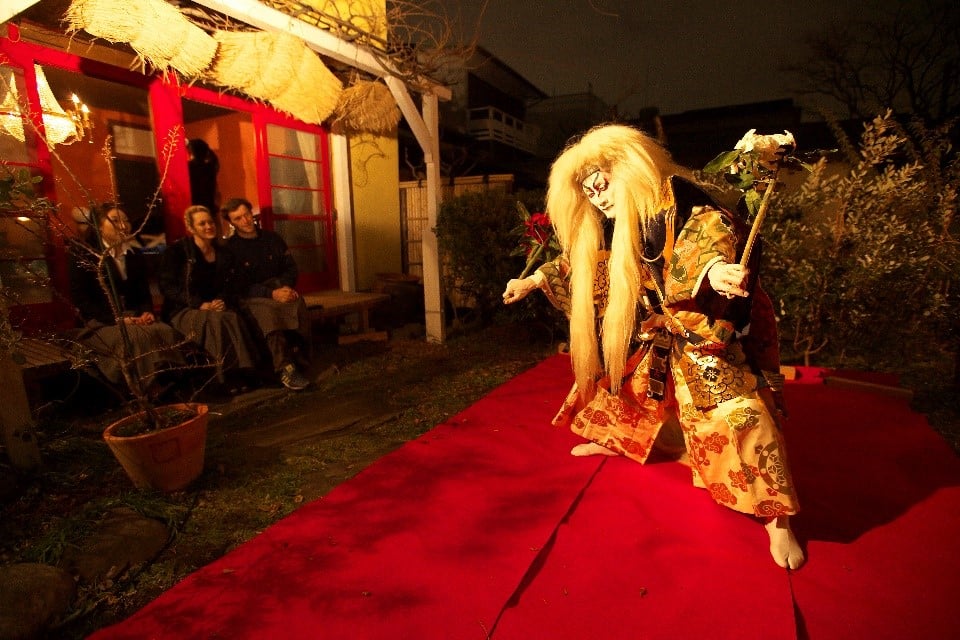

今やインバウンドにより多くの外国人を各地で見かけますね。
日本は魅力があり旅行したい国の一つになりました。
ただ、海外の現地法人のスタッフが訪日されたときに、どこへ行こうか悩んだりしてませんか?
海外の大切なお客様や取引先、或いは海外拠点のスタッフがインセンティブ旅行で訪日される際に、どのようなおもてなしをしようか、お悩みの企業や担当者は多いと思います。
せっかく来日されるので、よくあるありふれたもてなしではなく、特別なもてなしをしたい。
良い印象を持って帰っていただきたい、そんな思いはグローバル社会の今ではいたるところで見うけられます。
そんなお悩みを抱えているご担当者の方へ、ありふれたもてなしではなく、特別なもてなしをしたい。日本人でさえなかなかできないことでもてなしたい、というお困りの方に弊社のこれまでの実績及び実例をベースにご紹介いたします。
インセンティブ旅行
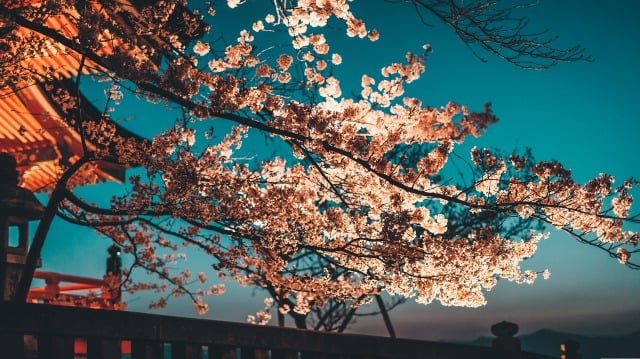
インバウンドとは
インバウンドとは海外から日本に来る外国人客や訪日旅行を言います。
日本は観光地が豊富で季節ごとに各地で旅を味わえる上、日本食もバラエティーに富み、文化的な深みもあることから、旅行先として人気のある国になりました。
日本企業においてもインセンティブ旅行(ご褒美旅行)として、海外の企業を日本に招待するケースが増えました。
インセンティブ旅行とは
インセンティブ旅行とは企業が営業などで売上や利益に貢献したスタッフを特別に報酬として旅行を行うことを言います。
以前は日本企業が海外旅行をインセンティブ旅行として、ハワイ旅行やアメリカ・ヨーロッパへの視察旅行などが多くありました。
最近ではインバウンド需要により、アジアの国々から日本への報酬旅行が多くあります。
とりわけ、中国・台湾・香港・シンガポールなどのアジアの国々からのインセンティブ旅行は会社のステータスとして実施している企業が多くあります。
以前は、日本は物価が高くなかなか日本に行く機会が無かったのですが、アジアの国々の経済成長により、日本に行くゆとりが出てきたのもインセンティブ旅行が増えた要因でもあります。
一方で日本企業の日本人が海外に行くインセンティブ旅行は減りつつありますが、逆に、日本企業の海外の子会社や支店が、会社に貢献したスタッフを日本に招くインセンティブ旅行は増えつつあります。
訪日外国人数が4000万人に迫った現在では、インバウンドのインセンティブ旅行はまだまだ増える傾向にあります。
訪日インセンティブ旅行とは
訪日インセンティブ旅行としてよくあるケースは、海外の日本の企業の支社が、特定の成績が優秀な社員もしくは社員全員を日本にご褒美旅行として招待するケースと、海外の企業が日本へのご褒美として旅行で招待するケースがあります。
前者は、日本の本社が主導で計画し、後者は海外の企業が自主的に計画するケースが多くあります。
また、どちらも共通していることとして、せっかく日本に行くのだから、日本らしい体験をしたいとか、日本の文化を交えてチームワークを高めるためのチームビルディング研修を含まれるケースが多くあります。
以下は、その注意点と事例をまとめたものになります。
訪日インセンティブ旅行で外国人をもてなす3つの注意点
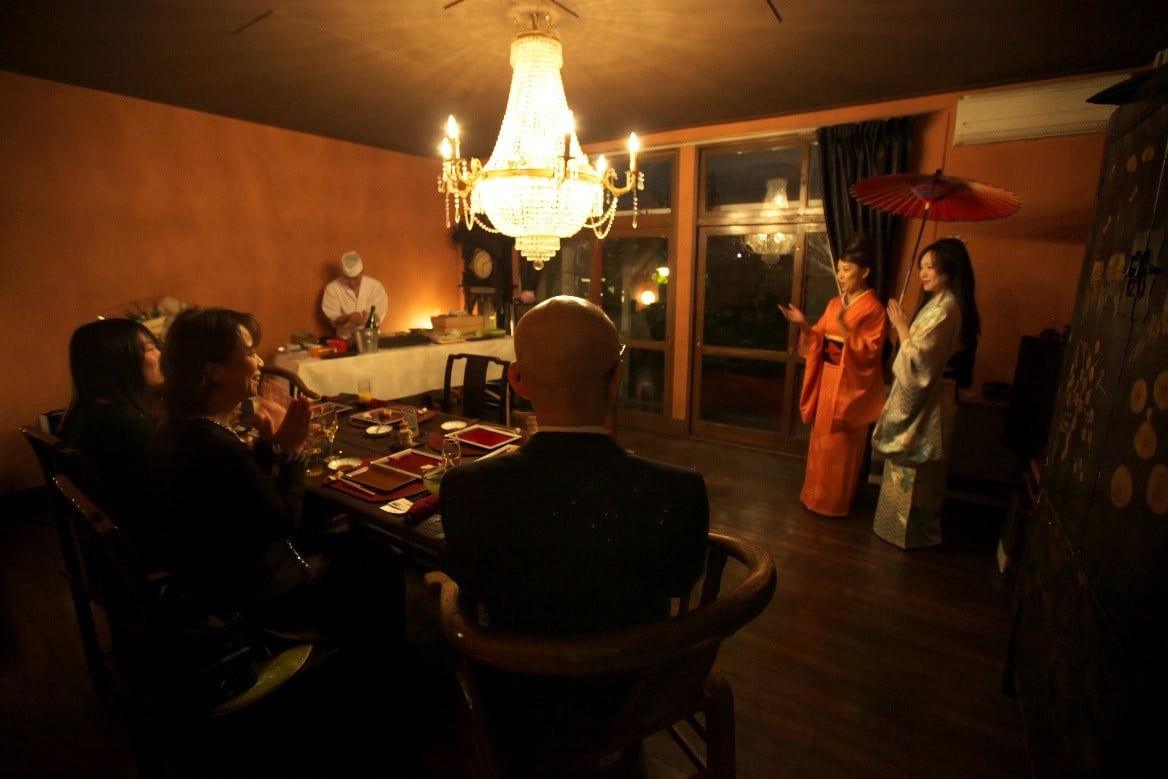
注意点1 相手の立場にたつ - 自分が相手だったらどう思うか、よく考える
できるだけ相手の立場に立つことが必要です。よくあるケースとして、日本人が良かれと思いこみ、おもてなしをすることです。
例えば、訪日する方は日本文化に高い興味を持っているので、能などの日本の伝統芸能をしっかりと味わっていただこうと日本人と同じ感覚で準備します。
しかし座布団の上にあぐらをかいて1時間ほどもその恰好で観ていると、座布団になれていない外国人はその時間が苦痛に変わっていきます。
また、文化的知識だけでなく歴史的知識もないと、日本人ですら長い時間を観ているのはかなり大変です。
例えば、戦国大名の史跡の見学は初めのうちは日本の文化を見る喜びで楽しいのですが、ほとんどの外国人は戦国時代の時代背景が分からないためやがて退屈に変わっていきます。
同様のことは日本人が海外に行ったときもよくおこることです。
例えば、ヨーロッパで有名なお城など史跡を巡っても、歴史的背景が良くわからず、似たようなお城をなんとなく眺めているいるケースも多いと思います。同じような思いを相手にさせないことが大切です。
注意点2 本物の日本文化を伝える - 一工夫を加える
本物の日本文化を伝えることは大切です。
ただ日本文化は非常に多様性があり、他国文化を自国文化に直ぐに取り入れ、それを自国文化に変化させ受け入れるといった享受性があります。
その多文化の享受性こそが、日本文化の面白さとして海外では受け入れられています。
歌舞伎など本物の日本文化を観ていただくのは良い機会と思いますが、たんに歌舞伎を見るだけでなく、そこにもう一工夫があると、日本らしいと思われるケースが多くあります。それでは、もう一工夫とはどういったことか、具体的には以下のおもてなし事例5選を参考になさってください。
注意点3 国籍、性別、年齢、個人or団体、訪日回数によって日本社会の理解度が違う
日本が経済大国であり、日本人が働き者といったことはおおむね世界中の方が知っております。とりわけ、世界のビジネスマンは日本について彼らなりの知識を持っています。
一方、国によっては日本社会は未だ侍がいると思っている方は意外に多いのも事実です。
ただ、そのような方は十分に情報が入る環境にはないこともケースとしてはよくあります。
おもてなしにしついてこの視点で大切なことは、国籍、性別、年齢、個人or団体、訪日回数といったお相手の基本情報を理解しておく必要があります。
アジアなど日本に物理的に近い国は、日本のテレビ番組などでよく日本の文化に触れています。
一方、アフリカなど日本から離れている国は、相対的に日本の文化になじみがありません。
また性別も重要です。
男性は格闘技が好きですが、女性は格闘技に興味がなく着物や華道に興味がある方が多くいます。
おすすめインセンティブ旅行 おもてなし事例5選
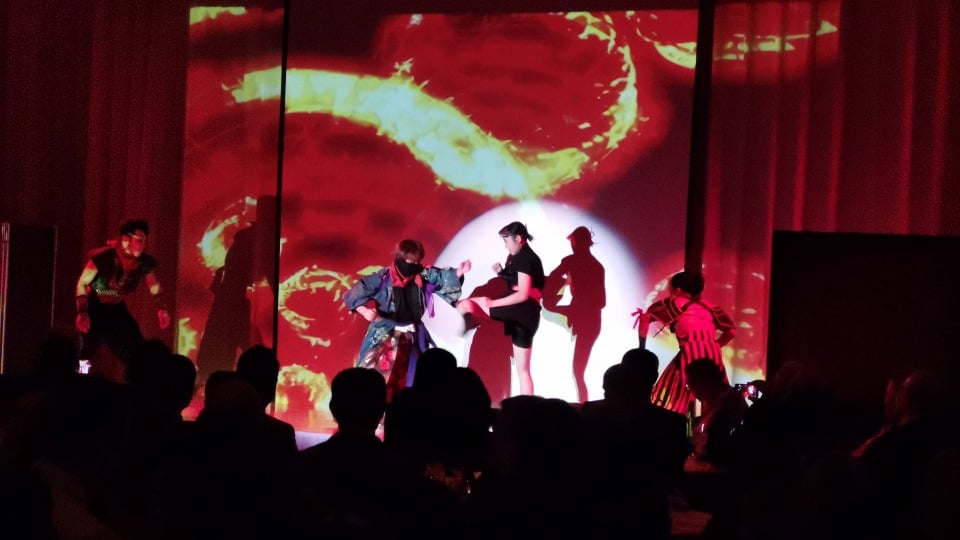
外国人が好きな日本の文化体験についてご興味のある方はこちらの記事も参考にしてください。
参考記事:海外からみた日本 外国人が好きな日本の文化体験 事例10選
ここでは弊社がこれまでご一緒させていただいたインセンティブ旅行におけるおもてなし事例を5つ選びました。
上述しましたように、イベントを実施する際に単に日本文化をお伝えするという点だけでなく、そこの一工夫を加えることにより、そのイベントはかなり引き立ちます。
延いてはそのことが、良いイメージとしてお客様の記憶に残ります。
また、きちんと解説を入れることも重要です。
何の知識もなくただ見ているのは、時間と共に感動から苦痛に変わっていきます。短い時間でもお客様に感動していただくことが大切です。
おもてなしの基礎が詰まっている茶道
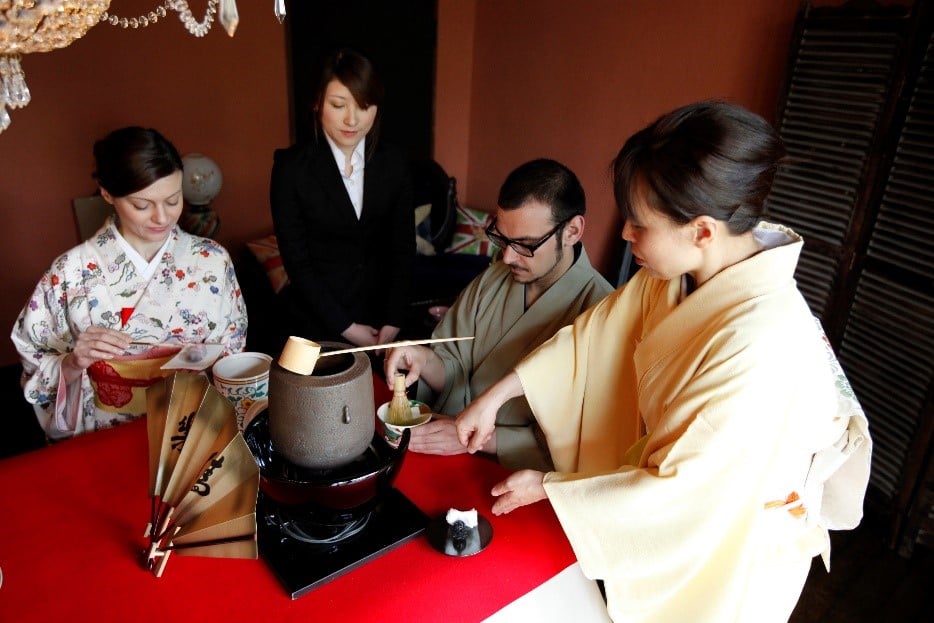
茶道は日本のおもてなしの基礎が詰まっております。おもてなしの作法は茶道から形式化されてきたと言ってもよいでしょう。茶道の作法を習うのはそれなりに面白みがあります。
更に喜んでいただくために一工夫を加える茶道とは、ライブ音楽を入れるのは効果があります。お茶をたてるのはおもてなしをする側で、お客様はあくまでおもてなしを受ける側という考えはあります。
しかしながら、外国人の大切なお客様に対しせっかく茶道でおもてなしをされているなら、お客様にお茶をたてていただき、茶道の理解を深めることは、お客様にとっても記憶に残る良い経験になると思います。
エンターテイメントとしての空手
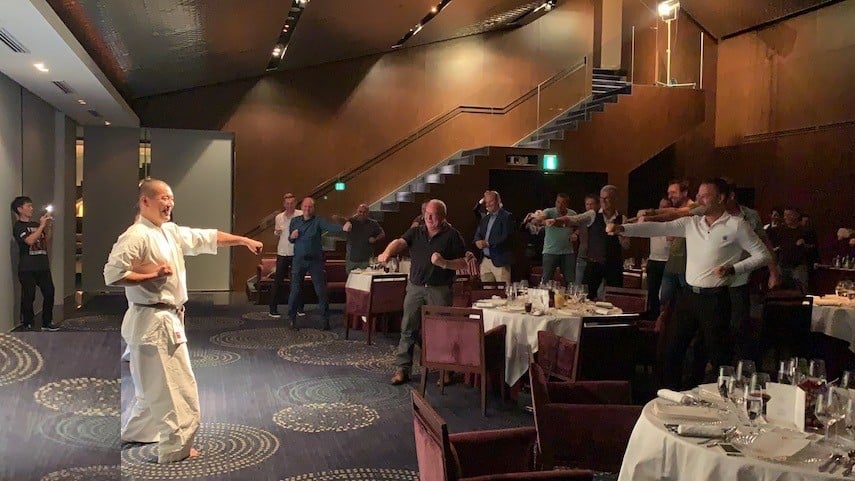
空手は東京オリンピックで正式種目になったこともあり、外国人も関心が高まっております。
とりわけ、空手は心技体を意識した日本のスポーツで、勝ち負けだけでなくそこで学ぶ日本的な礼儀やマナーにむしろ興味があるようです。
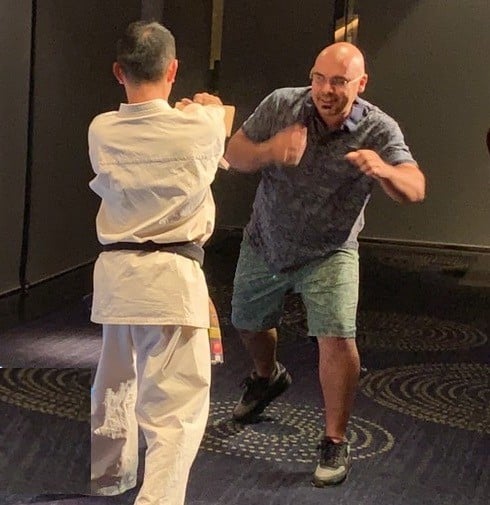
また、空手は型を基本動作とし、その型を習得することにより、護身術を学びたいという気持ちは女性にはあるようです。
空手を大切なお客様やVIPで披露する際は、型だけをお見せするのではなく、空手のすごみを見せるには、瓦割りやバット折り、また空手の基本となる心構えについての説明があった方がよいでしょう。
神秘的なスポーツ相撲

相撲は外国人にとってはとっても神秘的なスポーツです。稽古のあり方や上下関係は相撲イベントを実施するたびにひっきりなしに質問が飛んできます。「どれくらい食べるの?」
「どうすればそんなに大きくなれるの」「力士は何人くらいいて、誰が一番強いの?」などは、本当によく聞かれます。
何故このように沢山の質問がでてくるかといいますと、相撲はとっても日本らしいスポーツで海外では似たようなスポーツが無いので、身近にいない分より関心が高くなるからです。
元力士が本気で取り組み合う姿勢を目の当たりにし、かつ元力士と一緒に相撲を取ることによって、相撲力士の本当の凄さが伝わり、多くのお客様は満足してお帰りになられます。
やっぱり忍者
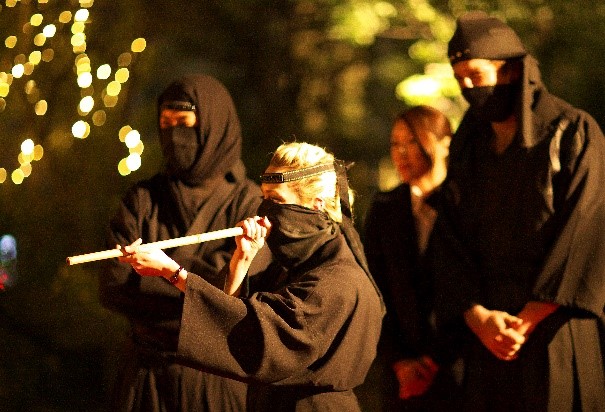
海外では忍者というと漫画や映画でよく登場し、「日本といえば、やっぱり忍者だよね!」というイメージが定着しています。
ただ、何も考えずに普通に忍者ショーをやってしまうと、休日に子供向けにショッピングモールでやっている連帯ものレンジャーのようになってしまします。
本当に忍者を楽しんでいただくには、照明・音楽・シナリオなどいくつか工夫が必要になります。
また忍者は暗闇で活躍るイメージが強いので、サプライズとしてショーを実施するには高い効果が見込めます。
伝統の歌舞伎
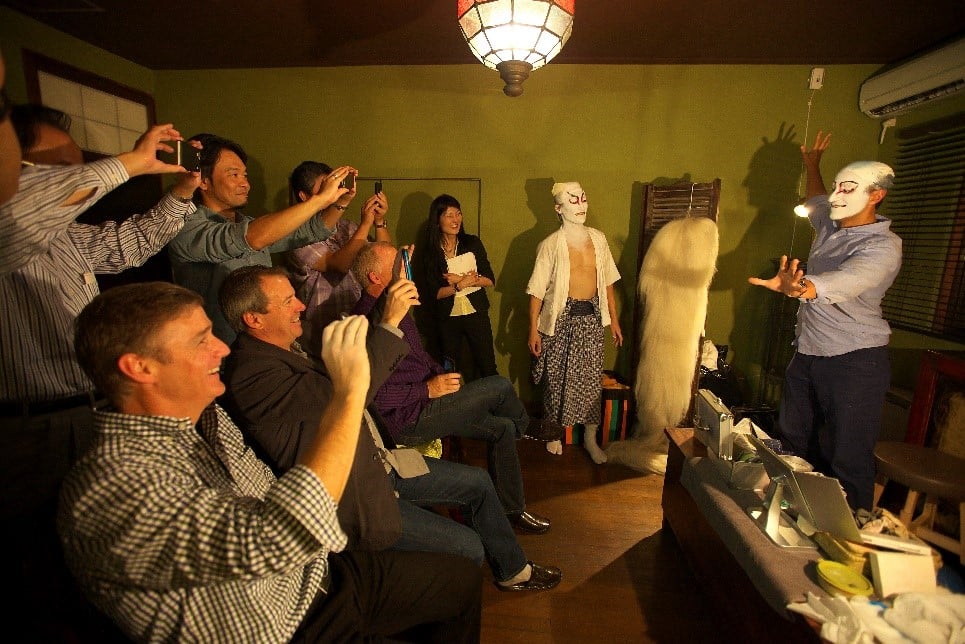
歌舞伎は日本を代表する伝統芸能です。
“能“や“芸者”と並んで海外でも有名な舞踊です。日本に来たら歌舞伎を観たいという外国人は多くいます。
せっかく歌舞伎鑑賞に行った外国人でよくあるケースが、ストーリーと踊りがよくわからなかったということはよく聞かれます。
芸術に説明はいらないものかもしれません。
しかしながら、全く知識が無い外国人に素晴らしい日本の芸術だからよく鑑賞してと行っても、本人からするとかなり大変なことです。
歌舞伎を観るには事前に予備知識をインプットすることが大切です。
また他の芸能と同様に、その舞台裏(役者が変身していく姿)などを観た方が、多くの外国人は喜びます。このようなし仕掛けを体系的に整理し、外国人にお見せすることが大切です。
まとめ
海外の重要なお客様や取引先や要人やVIPが訪日される際はいろいろ頭を悩ませます。
とりわけ、担当者の負担は思った以上にあります。
そんな時は、相手の立場になって考えること、そして一工夫を加えることにより、お客様はより深くおもてなしを受けたと感じることでしょう。日本の伝統的なイベントを設けるときは、きちんと解説を入れて飽きさせない工夫も必要です。
また、おすすめイベントとして、茶道・空手・相撲・忍者・歌舞伎を取り上げておりますが、どんなイベントにおいても、お客様目線で考えることが重要です。
お客様目線とは、国や地域によって日本への理解度も違うので、誰でもわかっていると思いこまず、歴史的背景や文化的背景などの最小限の情報はインプットするということや、せっかくのイベントが感動から苦痛に変わらないように空間的かつ時間的なことを配慮する必要があります。
このようなことをきちんと意識するだけで、大切なお客様は良い印象が残り続けるでしょう。
インセンティブ旅行誘致のポイントについてご興味のある方はこちらの記事も参考にしてください。
参考記事:https://mice.jnto.go.jp/other-support/incentive-travel-promote/

私たちは日本独自のおもてなし文化を世界の人々に広めるために日夜努力しています。外国人ゲストの接待・おもてなしに関するご相談もお気軽にお問い合わせください。



